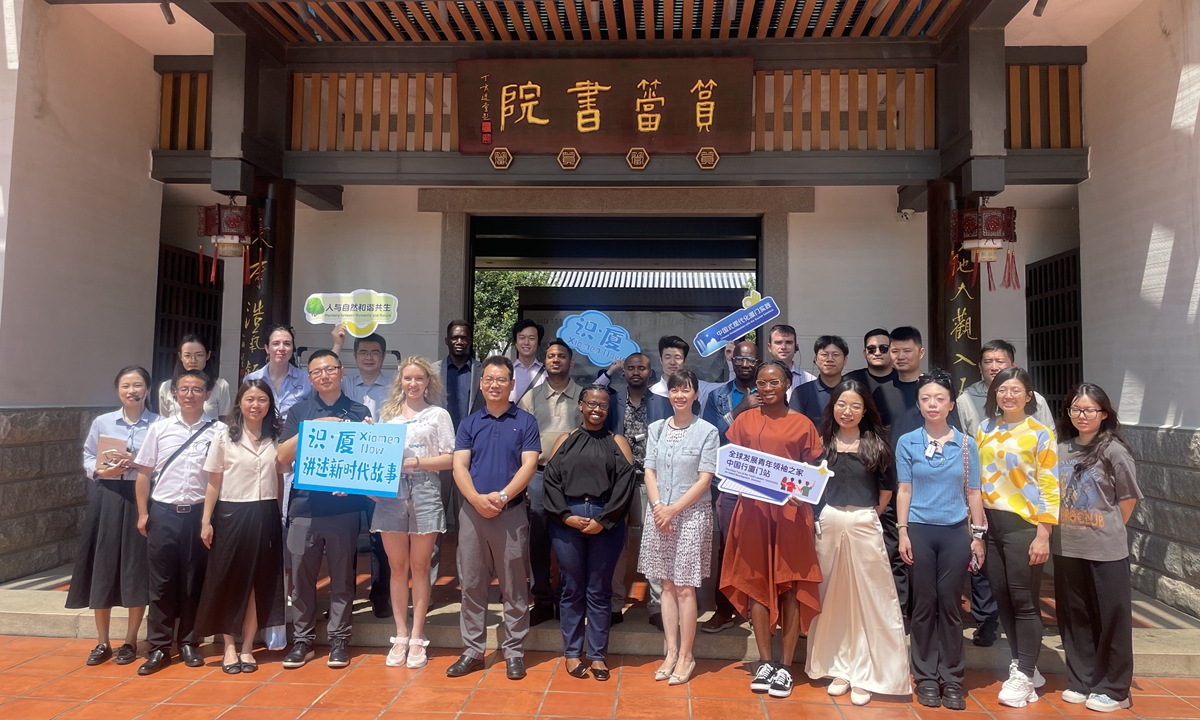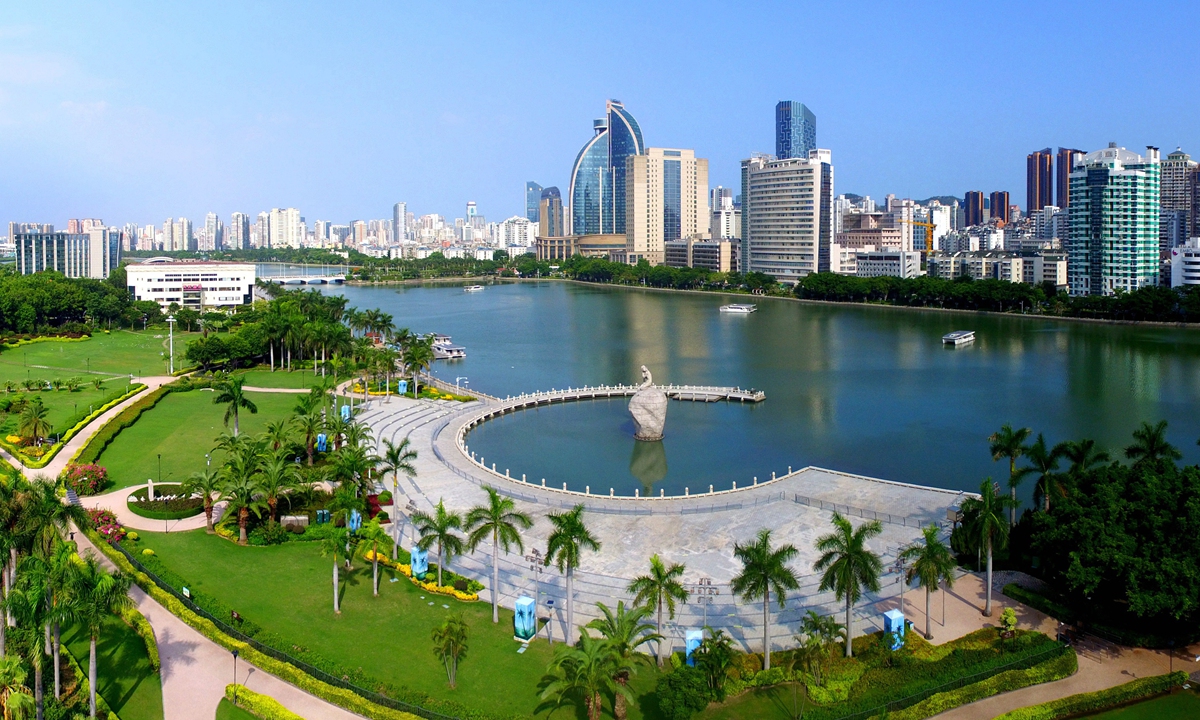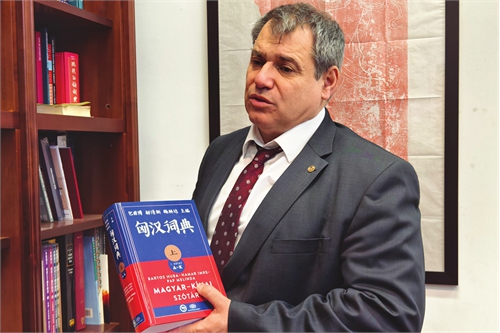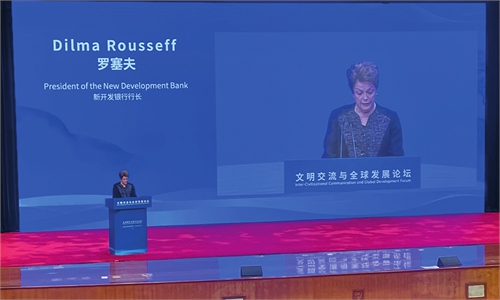ARTS / CULTURE & LEISURE
Youth leaders seek cooperation ideas through China Tour

Members of the Youth Leaders Community for Global Development have a group photo taken in Xiamen, East China's Fujian Province, on May 28, 2024. Photo: Lu Wenao/GT
In a move aimed at fostering global cooperation and sustainable development, members of the Youth Leaders Community for Global Development (YLCGD) are, this week, on the maiden China Tour by the organization to explore various initiatives in the country.Starting their tour in Xiamen, East China's Fujian Province, the youths were introduced to the city's innovative efforts to create a new development framework that harmonizes urban growth with environmental sustainability.
The city's transformation, particularly the revitalization of Wuyuan Bay and Yundang Lake, stood out as remarkable examples of ecological restoration and urban planning.
Once polluted and neglected, Wuyuan Bay has since been rehabilitated into Xiamen's iconic "guesting house," while Yundang Lake now boasts clear water and thriving wildlife, symbolizing the harmonious coexistence of man and nature.
Ana Luisa Fernandez de Lara Lopez, First Secretary and Economic Attaché of the Embassy of Cuba in China, was impressed by Xiamen's green development initiatives.
"A major dilemma looking at Xiamen's history and development project has been whether or not to sacrifice the ecological environment for the sake of economic growth and how to balance social development and environmental protection," she said. "It is evident that, over the years, the city has managed to find the answers, with significant improvements in air quality, green development of urban areas, and energy conservation in key areas such as industry, transportation, construction, and public institutions."
Master student at the China Agricultural University Luke Kakpa Pessima from Sierra Leone echoed her sentiments.
"This journey emphasizes the transformative potential of visionary leadership and collective action, showcasing that economic growth and environmental preservation can coexist sweetly," Pessima said.
He advocated using Xiamen's experience as an international model for building cities and communities that exist in harmony with nature.
"Xiamen has emerged as a global example of sustainable urban growth, demonstrating innovative approaches and a steadfast commitment to environmental conservation."
Lodis Michael, a Kenyan PhD student at Peking University's Institute of South-South Cooperation and Development, told the Global Times he wants to bring China's experience back home to help more people.
"There are so many things that I have learned from these sites that we should also replicate," Michael told the Global Times. "These are the things that we, as the policymakers, should prioritize so that they can help our people."

A view of the Yundang Lake in Xiamen, East China's Fujian Province Photo: VCG
Michael emphasized the responsibility of youth leaders to transfer the knowledge and experiences gained in China back to their home countries. By implementing these best practices, they can inspire and educate local communities, thus driving sustainable development globally, he said."China developed through hard work. And also for them to reach this stage, there were some environmental conditions, but they had an idea that, to cause less impact to the environment, they have to integrate green development and green infrastructure," he said.
Following their inspiring visit to Xiamen, the group, consisting of nearly 20 young entrepreneurs, scholars, and trainees from China House of Foreign-Aid programs, traveled to Northwest China's Ningxia Hui Autonomous Region, where they delved into local environmental protection and sustainable development projects.
The Ningxia tour aimed to provide further insights into China's diverse approaches to ecological conservation and sustainable living. The knowledge and connections they gain during the China Tour will undoubtedly contribute to a greener and more prosperous world for future generations.
Initiated in 2023, the YLCGD aims to empower the youth and enhance their capacity to drive the implementation of the Global Development Initiative and the UN 2030 Agenda for Sustainable Development.
More on board
Many of Xiamen's current programs target BRICS countries, but as the intergovernmental organization expressed the intention for membership expansion in 2023, it allows the possibility for other countries to join in.
A Heart Sapling Visiting Scholar Program at the Xiamen Cardiovascular Hospital Xiamen University has been underway since 2022, attracting medical scholars such as Indonesian cardiologist Arief Aji Subakti and Indian cardiologist Kakarla Saikiran.
Aimed at promoting exchanges and collaboration, the program develops talents to boost diagnostic and therapeutic skills in cardiovascular health and contributes to the improvement of global cardiovascular wellbeing.
Saw Yee Fung, a Malaysian PhD student at the Institute of South-South Cooperation and Development, Peking University, highlighted the interconnectedness of nations in addressing climate change and sustainable development.
"China has made tremendous progress in technology, which is very impressive. My first visit to China was over 10 years ago, and the progress since then has been remarkable," Saw told the Global Times, before noting she expects more collaborations.
"China has made a lot of efforts to align with the world. There's a lot we can learn and participate in. I've learned a lot on this trip and made many connections. I hope there will be more opportunities for integration and collaboration in the future."
She pointed out that increased youth exchanges could spark innovative ideas and foster a clearer understanding of collaborative opportunities, ultimately aiding in tackling global challenges collectively.
"International exchanges are crucial because no country can face global challenges like climate change and sustainable development alone," Saw said.
"Each country has its strengths, be it in natural resources, technology, or the environment. By learning from each other, we can better address these challenges and collaborate effectively."
Michael also expressed his request to have more countries come on board.
"The idea of the Belt and Road Initiative is inclusivity, openness, and win-win cooperation," Michael said. "To capture the interests of developing countries, I think the best thing is to have more inclusivity."
Pessima called upon global youth leaders to unite in their efforts toward promoting environmental sustainability.
"As members of YLGD, we are tasked with learning from Xiamen's success and amplifying its impact on a global scale," he said.
"Together, we can build cities and communities that succeed in harmony with nature, ensuring a greener and more prosperous world for generations to come."



